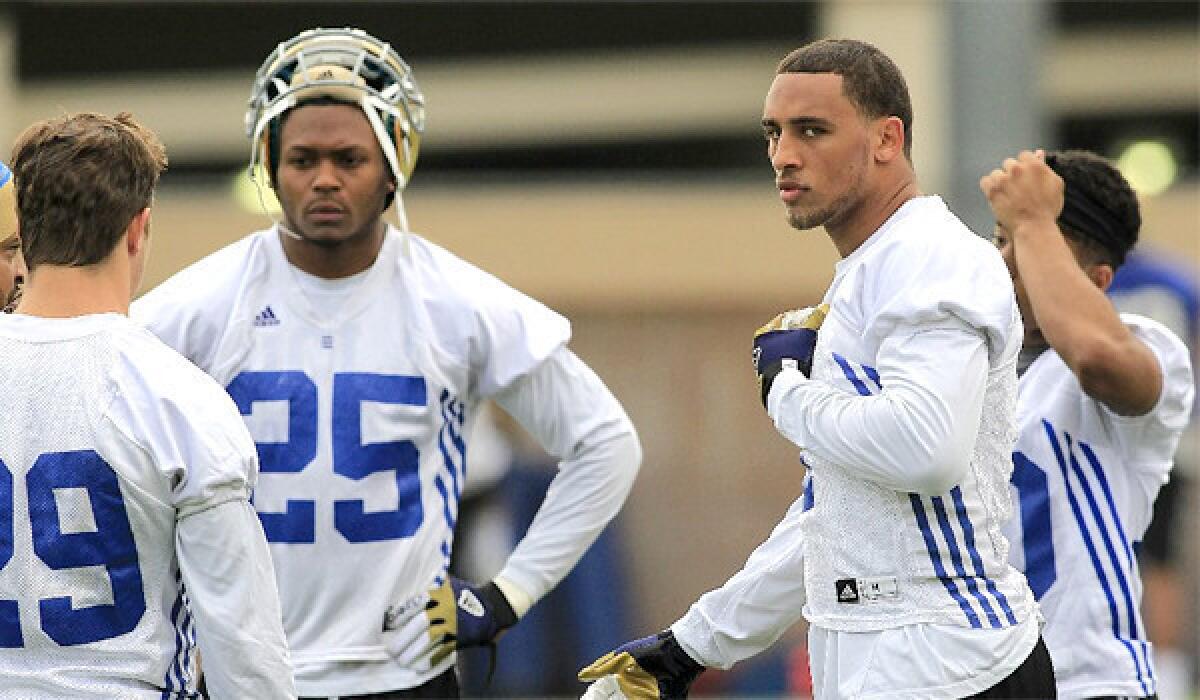For UCLA’s Dietrich Riley, Operation Comeback is in progress

- Share via
Dietrich Riley wore a Cheshire cat-like grin as he sat on a bench outside Morgan Center at UCLA. His expression was the polar opposite from the hangdog look he carried around spring football practice a year ago.
Riley has dealt with the unknown. He had been rushed to a hospital after a head-first collision with California running back Isi Sofele during a 2011 game. To play football again, he needed neck surgery. And there were no guarantees.
The kind of direct, point-A-to-point-B path that Riley employed on the field as a hard-hitting safety didn’t help him off the field. He vacillated about having the surgery. But then UCLA Coach Jim Mora hooked him up with Peyton Manning, who underwent a similar procedure, and Riley sought out others who had been in comparable situations.
Given the nudge he needed, he underwent the surgery — and the result brought him a new level of joy a week before the start of UCLA’s spring practice.
“I opened my locker and there were shoulder pads and a helmet in it,” Riley said. “I was full go.”
The Bruins certainly have a place for Riley. UCLA’s secondary was cleared out by graduation and Tevin McDonald’s dismissal from the team. Riley, who will be a junior in the fall, brings 19 games of experience to a secondary loaded with sophomores and freshmen.
“Once I have that first real hit, that’s when I’ll know I’m really back,” Riley said. “I have thought about it every day.”
Riley earned a reputation as a big hitter from La Canada Flintridge St. Francis High, resulting in a tug-of-war recruiting struggle between UCLA and USC. He was the hammer, the ballcarriers were the nails. College opponents were given a duck-and-cover warning when Riley separated Oregon State running back Jacquizz Rodgers from his helmet in 2010.
“I’ve seen tape,” said Mora, who is in his second season as UCLA’s coach. “He’s a missile.”
Riley locked onto Cal back Sofele in the fourth quarter of that 2011 game, but first contact was made with the top of his helmet, a dangerous tactic.
The collision left Riley motionless on the ground. He was put in a back brace and carted off the field.
“I just knew when I got on that stretcher that I was going to be fine,” Riley said. “I was moving my head from side to side. There wasn’t any doubt that I would have another opportunity to play. It was just, when?”
Answering that question took more than a year.
“The doctors were saying I was pretty fortunate to be walking, or even to be alive,” Riley said.
It was a lot for a 19-year-old to absorb. He was told that he would not be cleared to play football again unless he underwent surgery. Riley talked with his family, and worried.
He also grew weary of well-meaning but constant questions. The locker room was a haven, but it seemed that just as soon as he stepped outside, someone would ask about his health and his future. “That would just make me frustrated,” Riley said.
Going home didn’t help. “I would sit in my apartment every night and think deeply, ‘Is this what I really want to do?’” Riley said. “God blessed me with these talents, why not finish what I started?”
But it wasn’t that easy.
Riley waffled about undergoing the surgery — until he spoke with Mora and Manning.
“When you’re coming off a severe injury like he had, and the major surgery he faced, there’s going be some apprehension on his part and certainly on ours,” Mora said.
Mora provided the pros and cons and then provided a pro, tapping his NFL connections to arrange a telephone conversation between Manning and Riley.
“At first I was a bit nervous and rattled, because I grew up watching him playing on Sundays,” Riley said of the NFL star. “He’s a very genuine guy. I didn’t even feel like I was talking to Peyton Manning. It was like I was talking to my coach. That convinced me.”
Riley had two vertebrae fused. Emotional ebbs and flows followed.
The recovery period drained him. “I sat at home on my birthday in a neck brace,” Riley said. “It was tough.”
The season wasn’t any easier. Early on, Riley watched in street clothes. Then, gradually, UCLA defensive backs coach Demetrice Martin brought him into the fold. By midseason, Riley was being worked into the scout team rotation, though he was still not allowed in contact drills. And he began suiting up for games.
“He is a natural leader,” Martin said. “He did a lot of things I wanted and I wanted the younger guys to latch on to that. Your dad can tell you something, but a friend will tell you the same thing differently and you’ll pick it up.”
Riley helped in position meetings. He also participated in simulated tackling drills. “I wanted him to get as many reps at tackling as possible before he had to go live,” Martin said.
Riley still hasn’t taken part in full-contact drills. In UCLA’s first day in pads last week, he got his arm tangled with a teammate’s during a drill and sustained a mild shoulder separation. But the injury isn’t expected to keep him out long.
He has waited long enough.
“Once I get on the field and get that adrenaline going on the first hit,” Riley said, “I’ll just run around making tackles … the right way.”
twitter.com/cfosterlatimes
More to Read
Go beyond the scoreboard
Get the latest on L.A.'s teams in the daily Sports Report newsletter.
You may occasionally receive promotional content from the Los Angeles Times.











